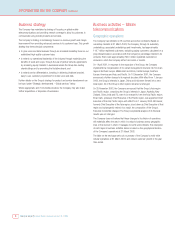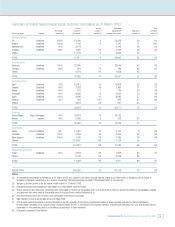Vodafone 2003 Annual Report Download - page 18
Download and view the complete annual report
Please find page 18 of the 2003 Vodafone annual report below. You can navigate through the pages in the report by either clicking on the pages listed below, or by using the keyword search tool below to find specific information within the annual report.
Vodafone Group Plc Annual Report & Accounts and Form 20-F 2003
16
INFORMATION ON THE COMPANY Continued
Local marketing
In addition to the Group’s initiatives to establish a global Vodafone brand,
marketing is also performed on a local market basis. Customer database
marketing is widely used to communicate directly and, linked with customer
service, provides a strong basis for building customer relationships. Loyalty
schemes, such as the OmniOne loyalty programme in Italy, are beginning to be
used as a way of increasing customer satisfaction and reducing customer churn.
In the UK, the Group, along with other companies from various industries,
became a sponsor of the “Nectar card loyalty points scheme”during the 2003
financial year.
Associated companies are generally marketed under their local brands.
Distribution
Distribution is achieved through a wide variety of direct and third party channels,
with different approaches used to attract the consumer and business sectors.
Products and services are available directly to both consumer and business
customers in the majority of markets. Directly-owned stores are becoming
increasingly popular in most markets. The look and feel of these stores,
particularly in Italy, Greece and the UK, has become more user-experience
orientated during the year, with customers invited to try out service offerings
such as Vodafone live!. Local Internet sites offer products and services online
and sales forces are in place to discuss terms with business customers.
Indirect distribution includes using third-party service providers, independent
dealers, agencies and mass marketing. Service providers are prevalent in some
markets, most notably the UK. Marketing to third-party service providers includes
maintaining a competitive tariff structure, providing technical and other training
to their staff and providing financial incentives for service providers, their dealers
and sales people. It also entails providing assistance on advertising campaigns
and supporting the development of both specialist retail outlets and programmes
with multiple retailers. Service providers receive discounts on the Group’s airtime
rates for each tariff. Service providers also receive financial incentives from the
Group related to their success in attracting new customers to the network. These
comprise gross connection bonuses, airtime growth awards and other specific
incentives. Independent dealers are used in the majority of markets, with own-
branded stores, business “store-within-stores”and kiosks becoming increasingly
popular. Supermarket chains and multiple retailers are also used to achieve mass
distribution of prepaid products, with top-up vouchers available in a wide
selection of outlets such as petrol stations, newsagents and local stores.
In the United States, Verizon Wireless sells its service directly to customers
through its own sales force and stores, telemarketing centres and the Internet,
and indirectly through arrangements with independent agents such as consumer
electronic stores, specialised cellular stores, automobile dealers, department
stores and other retail stores. In certain areas, mobile services are sold through
resellers who, pursuant to FCC requirements, are allowed to purchase blocks of
mobile telephone numbers and to access mobile services at wholesale rates for
resale to the public. In the past twelve months, however, the use of resellers has
been reduced.
Seasonality
Traditionally, the Christmas period sees a higher volume of customer connections
contributing to higher equipment and connection revenues in the second half of
the financial year. Ongoing airtime revenues also demonstrate signs of
seasonality, with revenues generally lower during February, which is a shorter
than average month, and revenues from roaming charges higher during the
summer months as a result of increased travel by customers.
There is no assurance that these trends will continue in the future.
Business activities – Non-mobile
telecommunications
The Company’s non-mobile telecommunications businesses mainly comprise
interests in Arcor, Cegetel and Japan Telecom.
Arcor provides fixed network services in Germany. The German fixed line market
remains intensely competitive although Arcor has retained its position as the
leading private operator and the strongest competitor to Deutsche Telekom, the
market leader. Turnover from voice, data and Internet businesses increased in the
period, compensating for the reduction in carrier business caused by the
competitive market. During the period the contract voice customer base
increased by approximately 10% to 2,600,000 customers. Total traffic volumes
increased by 20% compared to the same period in 2002 to 25.3 billion minutes.
As described in more detail under “Information on the Company – History and
Development of the Company – Sales of businesses”, in January 2002 a
contract with Deutsche Bahn AG was signed to carve out Arcor´s railway specific
telecommunication and service business into the company Arcor DB-Telematik
GmbH. Following completion of the sale in April 2001, the remaining 50.1%
share of Telematik was sold to Deutsche Bahn AG in July 2002.
Cegetel is the second largest fixed line operator in France and the remaining
80% shareholder in SFR. The company offers broadband services in addition to
fixed line services. During the 2003 financial year, the Group increased its
interest in Cegetel to 30%.
The Group owns an effective 66.7% interest in Japan Telecom, the third largest
fixed line telecommunications operator in Japan, offering both voice and data
services. Since the Company gained control in October 2001, Japan Telecom’s
profitability has improved significantly as the benefits of management’s
transformation plan start to be realised.
The fixed line market in Japan remains extremely competitive following the lifting
of market entry restrictions and the maintenance of market share continues to be
a challenge in the customer voice segment. During the period the main focus of
the business has been on high-growth business opportunities and the delivery of
innovative data products and services. The corporate customer base continues to
expand due to the uptake of Internet Protocol (“IP”) data related services, with
the next-generation IP network “PRISM”, using optical fibres, being particularly
successful.
Additional functionality, such as new connectivity regarding IP-Virtual Private
Network accessibility via the Internet and network expansion for Ethernet
services, has been added to the network to enhance data services.
























